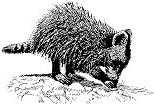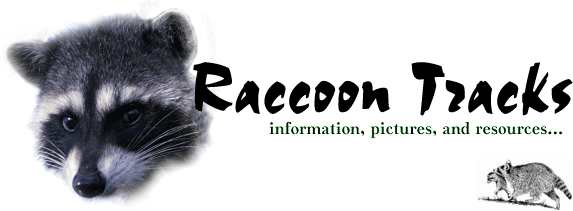|
PET RACCOONS?
It is the observation of this writer that raccoons are best left in the wild.
Many people have raised pet raccoons, e.g., Remo the Raccoon, whose owner made decided
accommodations to keep his friend Remo. It is difficult not to give credit to Remo's
owner/ companion for keeping Remo -- for he forthrightly did not minimize the difficulties.
He gives adorable, affectionate, intelligent, crafty, huggable, and amusing as some
of the "ten good reasons to have  a pet raccoon."
[45] On the other hand, others can tell you that a survey of animal shelters
and humane associations has found that 60% of all wild animals kept as pets do not
survive the first month of ownership. Of the remaining 40% of those wild animals
kept as pets, 20% die within the first year, and only 10% survive to the end of the
second year. [46] Though there may be exceptions, the case for not keeping a pet raccoon
is compelling. The Maskd_Bandit website gives "Twenty reasons not to have a
pet raccoon." Advocating wildlife rehabilitation, the Maskd_Bandit understands
that the chances of a pet raccoon contracting rabies is far less than what it would
seem listening to the news media; however, if a pet raccoon scratches or bites someone
(as they often do) some states require the pet raccoon to be killed, and the dead
raccoon's head -- for that is where the rabies virus is found -- sent to a lab for
testing. If the results come back negative, then the human has no problem with raccoon
rabies. Of course, it's too late for the raccoon. Even a pet raccoon that has been
properly vaccinated against rabies is not exempt from this requirement. Raccoon roundworms,
captive raccoon obesity, aggressive reverting, unsuccessful release into the wild
of formerly pet raccoons, illegality in many states of keeping a pet raccoon, difficulty
in finding a veterinarian to treat a pet raccoon, curious and destructive tendencies
of pet raccoons, messiness of pet raccoons, unpredictability of pet raccoons, full-time
commitment necessary to keep a pet raccoon, aggressiveness of pet raccoons during
mating season, and raccoon-proofing the home are a synopsis of some of the "Twenty
reasons not to have a pet raccoon." [47] a pet raccoon."
[45] On the other hand, others can tell you that a survey of animal shelters
and humane associations has found that 60% of all wild animals kept as pets do not
survive the first month of ownership. Of the remaining 40% of those wild animals
kept as pets, 20% die within the first year, and only 10% survive to the end of the
second year. [46] Though there may be exceptions, the case for not keeping a pet raccoon
is compelling. The Maskd_Bandit website gives "Twenty reasons not to have a
pet raccoon." Advocating wildlife rehabilitation, the Maskd_Bandit understands
that the chances of a pet raccoon contracting rabies is far less than what it would
seem listening to the news media; however, if a pet raccoon scratches or bites someone
(as they often do) some states require the pet raccoon to be killed, and the dead
raccoon's head -- for that is where the rabies virus is found -- sent to a lab for
testing. If the results come back negative, then the human has no problem with raccoon
rabies. Of course, it's too late for the raccoon. Even a pet raccoon that has been
properly vaccinated against rabies is not exempt from this requirement. Raccoon roundworms,
captive raccoon obesity, aggressive reverting, unsuccessful release into the wild
of formerly pet raccoons, illegality in many states of keeping a pet raccoon, difficulty
in finding a veterinarian to treat a pet raccoon, curious and destructive tendencies
of pet raccoons, messiness of pet raccoons, unpredictability of pet raccoons, full-time
commitment necessary to keep a pet raccoon, aggressiveness of pet raccoons during
mating season, and raccoon-proofing the home are a synopsis of some of the "Twenty
reasons not to have a pet raccoon." [47]
According to Leonore Brandt, former Curator of the Cincinnati Children's Zoo, pet
raccoons require a great deal of personal attention and companionship from their
owners, often resorting to squealing and whistling to get it. Kept in a cage, a raccoon
is still a wild animal, while handled daily and let out of the cage, it becomes more
of a pet. Though owners may be willing to let a pet raccoon run freely in the house,
their thick coats do equip them to live outdoors year round. Springtime is the season
in which raccoons are born. Baby raccoons snuggle up to hot water bottles, when they
miss their mothers. Brandt observed that pet raccoons -- trained from very young
-- respond well to a gentle "no-no" rather than a slap; and, whoever is
the primary caregiver of a pet raccoon will become the focus of the raccoon's attention.
The higher the inquisitiveness of the raccoon, the higher its I.Q. If the baby raccoon
is allowed only to play with the caregiver's sleeve -- not their hand -- biting will
be associated with the sleeve, while affection or feeding will be connected to the
hand. The appetite of a raccoon is voracious, and its diet is virtually limitless,
including fruit, vegetables, insects, fish, small animals, roots, and other vegetation.
Attracted to water, raccoons often wash their food before eating, making it important
to provide a pet raccoon with a water container for drinking and washing, as well
as a separate "tub" for bathing. Raccoons are nocturnal, meaning that they
are normally awake at night, though they can be somewhat reprogrammed. Raccoons do
catch some of the same parasites of cats and dogs, so small cubs can have worms,
i.e., Baylisascaris procyonis (raccoon roundworms). They have also been known
to catch the common cold from their owners. Clean cages are not only important for
the raccoon's health, but for their mental well being, as well. [48]
back home

Copyright © 2005 Raccoon Pictures & Facts
While this website has no affiliation with Havahart®, the
humane treatment of animals is encouraged!
Member of Fohn.net
|
